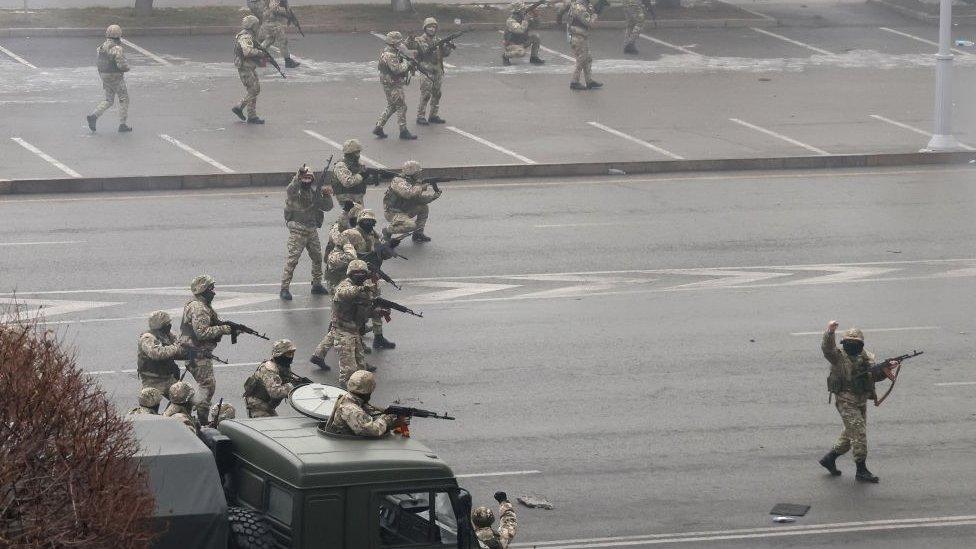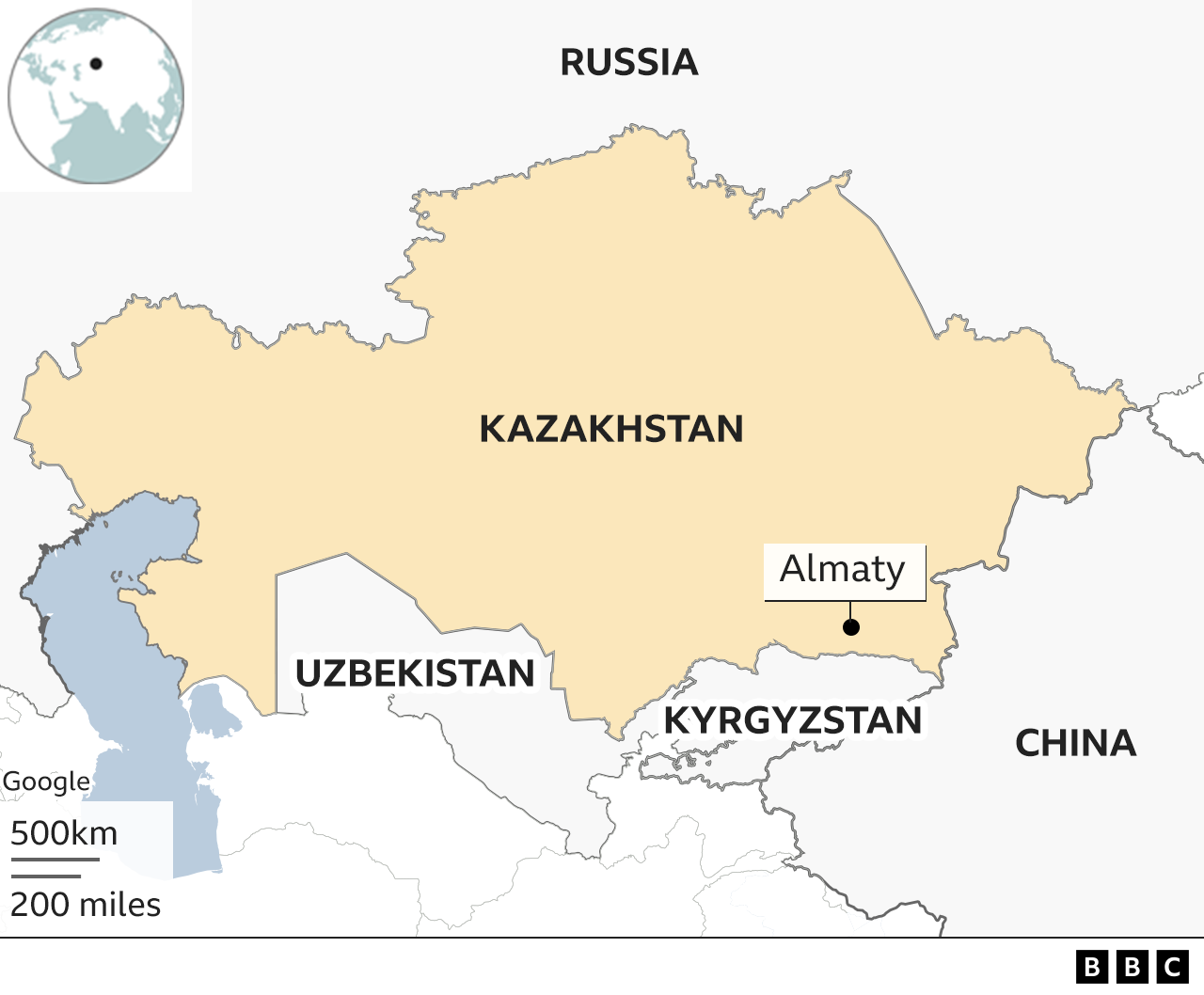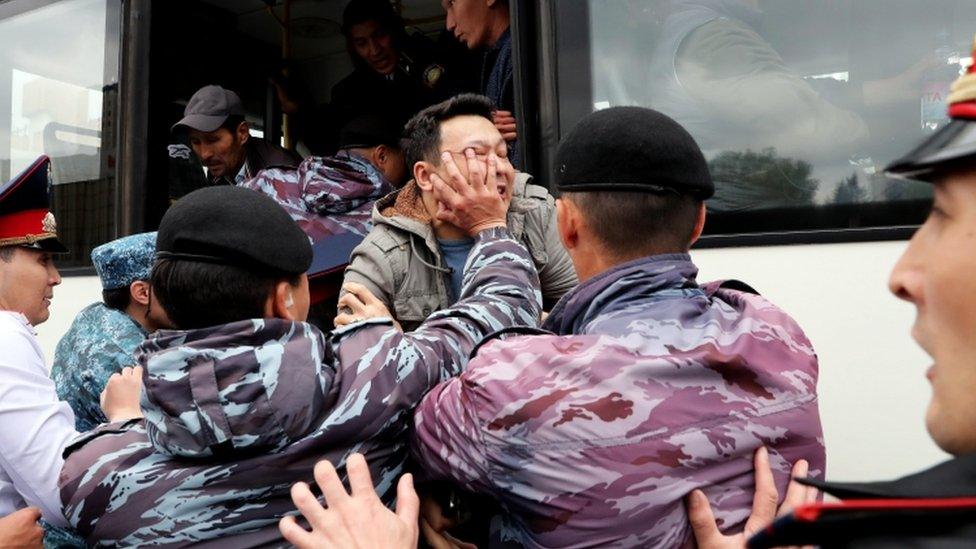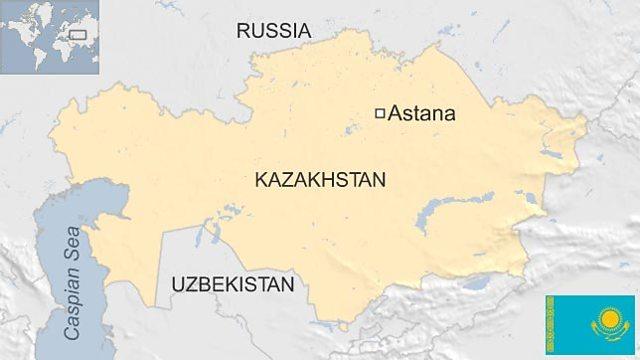Kazakhstan unrest: Fresh gunfire as president says order largely restored
- Published

Security forces on the streets of Almaty, Kazakhstan's biggest city
Fresh gunshots have been heard in Kazakhstan's largest city, as the president claims order has been largely restored after a violent crackdown to days of anti-government demonstrations.
Reports said gunfire was heard near the main square of Almaty, the epicentre of protests sparked by a fuel price hike.
The interior ministry said 26 "armed criminals" and 18 security officers had been killed so far in the unrest.
Russian-led forces have arrived in the country at the president's request.
Internet access in the country is down and little independent information is coming out. Armoured personal carriers and troops were seen in the main square of Almaty on Friday, the Reuters news agency said.
More than 3,000 people have been arrested, according to the interior ministry, and local media said 70 checkpoints had been set up across the country.
In a statement on Friday, President Kassym-Jomart Tokayev said "constitutional order [had] largely been restored in all regions of the country" and that "local authorities [were] in control of the situation".
The president. who has blamed foreign-trained "terrorists" for the unrest without giving evidence, said the operations would continue until "the militants are completely eliminated".
BACKGROUND: Kazakhstan country profile
CONTEXT: Why is there unrest in Kazakhstan?
As the protests escalated, President Tokayev appealed to the Russian-led Collective Security Treaty Organisation (CSTO) for support. The bloc includes Russia, Kazakhstan, Belarus, Tajikistan and Armenia.
The overseas force reportedly sent about 2,500 soldiers to Kazakhstan. The CSTO says the troops are a peacekeeping force and will protect state and military installations. They will stay in the country for several days or weeks, the Russian RIA news agency reports.

Kazakhstan: The basics
Where is it? Kazakhstan shares borders with Russia to the north and China to the east. It is a huge country the size of Western Europe.
Why does it matter? A former Soviet republic which is mainly Muslim republic with a large Russian minority, it has vast mineral resources, with 3% of global oil reserves and important coal and gas sectors.
Why is it making the news? Fuel riots, which have escalated to become broader protests against the government, have resulted in resignations at the top and a bloody crackdown on protesters.

The US state department said it was closely monitoring the deployment of Russian troops. "The United States and, frankly, the world will be watching for any violation of human rights," a spokesman said.
"We will also be watching for any actions that may lay the predicate for the seizure of Kazakh institutions."
Watch: President's residence gutted as Kazakhstan clashes continue
The unrest began on Sunday when the cost of liquefied petroleum gas (LPG) - which many people in Kazakhstan use to fuel their cars - doubled, drawing protesters onto the streets.
The government has said that fuel price caps will be restored for six months. But the announcement has failed to end the protests, which have broadened to include other political grievances.
Kazakhstan is often described as authoritarian, and most elections are won by the ruling party with nearly 100% of the vote. There is no effective political opposition.
The bloodshed comes after President Tokayev sacked his cabinet on Wednesday in a bid to head off the demonstrations. He also fired his powerful predecessor, Nursultan Nazarbayev, who had held a national security role since stepping down as president.

Burnt down buildings and long queues
By Abdujalil Abdurasulov, BBC News, Almaty
The bustling square of Almaty has turned into a conflict zone, complete with burnt down buildings and vehicles.
Many people are scared to go outside, especially at night because clashes are continuing. The sounds of shooting and explosions remind people how dangerous it can be to leave their homes.
Local vigilante groups block the entrances to their villages near Almaty to prevent looting. Checkpoints and makeshift barriers block the entrance to the city, so people use narrow streets to get in and out of Almaty.
There are big queues at petrol stations. Residents struggle to buy food because shopping malls, supermarkets, cafes and restaurants are all closed, only small shops are still open. The internet blockade continues, so people cannot withdraw money, or top up their phones.


Related topics
- Published10 June 2019

- Published24 March 2023
